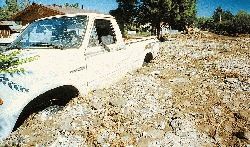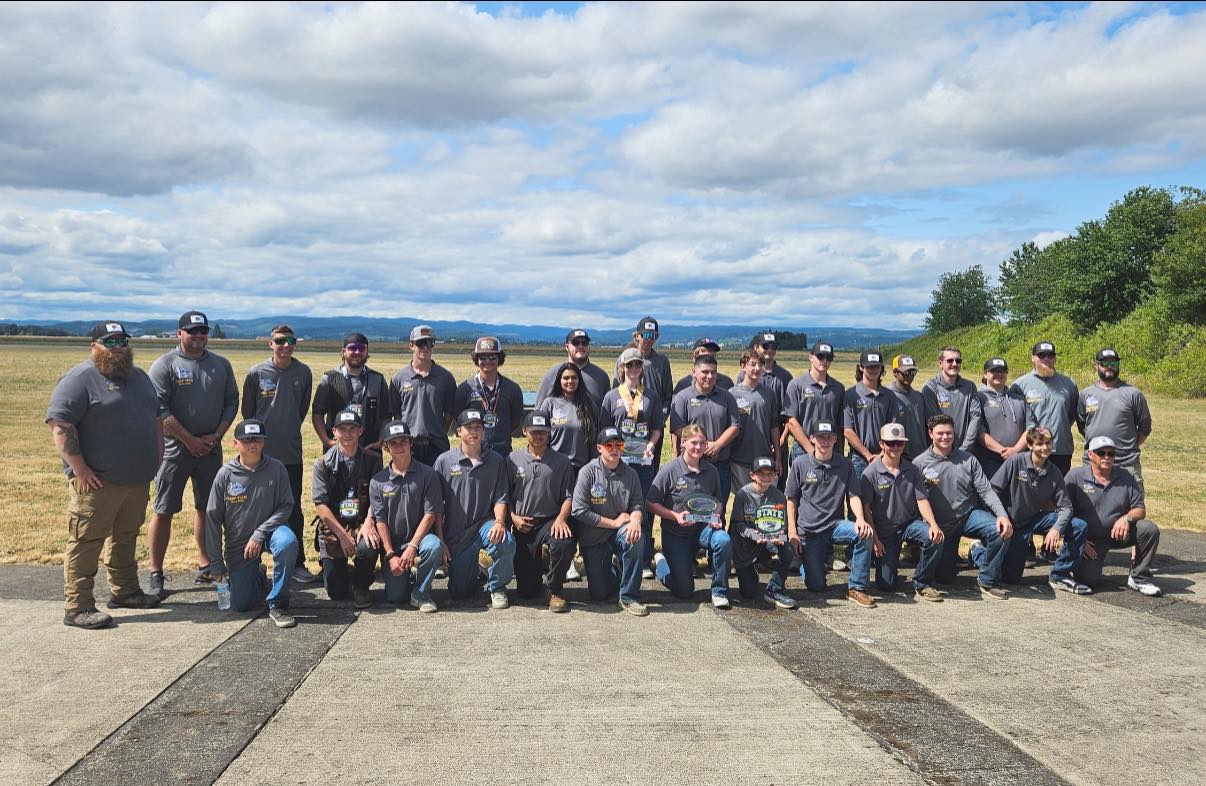Residents file $372,000 suit against Smith Ditch
Published 12:00 am Tuesday, January 11, 2005

- This photo from August 2003 shows Mike and Gayle Sanduk's Toyota pickup truck mired in muck after the Smith Ditch broke. The Sanduks are among 13 Baker City residents who have sued the ditch company and its shareholders. (Baker City Herald file photo/S. John Collins).
By JAYSON JACOBY
Of the Baker City Herald
A group of 13 Baker City residents has filed a $372,000 civil lawsuit against the Smith Ditch Company and the 20 or so people who irrigate their land with water from the ditch.
Baker City attorney Damien Yervasi filed the lawsuit Friday in Baker County Circuit Court.
The 13 plaintiffs, all of whom own or did own property in the east Baker City neighborhood that was inundated by muddy water when the ditch broke in August 2003, contend that the ditch owners’ negligence led to the flood that damaged their properties.
The plaintiffs, who include five married couples and three individual property owners, are seeking $372,503.20 $114,503.20 in economic damages, and $258,000 in non-economic damages.
They are demanding a jury trial.
Karen Szabo, one of the plaintiffs, said she and her husband, Steve, are still dealing with the mess the flood caused almost 17 months ago.
andquot;We don’t even have a back yard to use any more,andquot; Karen Szabo said this morning. andquot;It’s very frustrating to me.andquot;
She said the yard is fouled with mud that the ditch water picked up as it flowed down Spring Garden Hill.
andquot;The dogs are always tracking in mud,andquot; she said.
Karen Szabo said the water that soaked the ground beneath the couple’s home allowed mold to thrive. Several other plaintiffs have reported the same problem, according to the lawsuit.
andquot;Mold is an ongoing issue,andquot; Yervasi said Monday.
Another plaintiff, Jim Young, said he and his wife, Reva, have spent about $55,000 to fix flood damage.
Jim Young said he had to replace furnace ducts, and have mold removed from insulation.
Second lawsuit over Smith Ditch
This is the second civil suit to arise from the August 2003 Smith Ditch flood.
In July 2004 the city sued the ditch company and its shareholders for the $41,220.75 the city spent to clean muddy streets and yards.
The city’s lawsuit is pending.
The two complaints are similar.
In the residents’ lawsuit, Yervasi cites a 1906 agreement in which the city allowed the original ditch owners to cross city rights-of-way.
That agreement states that the ditch owners are liable andquot;for all damage done to the persons or property of others, arising from leakage or overflow of water from said ditch or canal growing out of want of strength in the banks or walls. . .andquot;
Yervasi said he believes that document clearly establishes the ditch company’s responsibility for compensating flood victims.
andquot;I think that we can prove the facts we allegeandquot; in the lawsuit, he said.
The plaintiffs claim the flood reduced the value of their properties by amounts ranging from $6,759 to $22,072.83. Those amounts are listed in the lawsuit as economic damages.
The plaintiffs further contend that those losses in property values are permanent because the ditch company continues to run water through the ditch during the irrigation season. As a result, the lawsuit states, the plaintiffs’ property andquot;is permanently threatened with similar devastationandquot; to the 2003 flood.
The plaintiffs claim the mold in their homes andquot;produces allergens, irritants and toxic substances harmful to plaintiffs.andquot;
The monetary damage from the mold is not listed in the lawsuit, but would be andquot;proven at trial.andquot;
Nor does the lawsuit list dollar amounts for damage to the plaintiffs’ yards, trees and shrubs. However, Yervasi said an Oregon law entitles the property owners to triple the actual amount of the damage to trees and shrubs.
Yervasi also seeks non-economic damages for his clients because they andquot;have lost the use and enjoyment of their home and property and have suffered emotional distress as a result of the negligence of defendants.andquot;
Those are the non-economic damages, and they range from $17,500 to $65,500.
Who is potential liable?
What’s likely to become a key issue in both lawsuits is the potential legal liability of the landowners who irrigate with water from the Smith Ditch.
Last fall David Coughlin, the Baker City attorney who represents the ditch company and its shareholders, filed a motion asking a judge to dismiss the city’s claim that the irrigators are personally liable for flood damages.
Yervasi’s clients also contend the shareholders are liable, as well as the ditch company.
He said he expects Coughlin will file a similar motion in response to the residents’ lawsuit.
Coughlin could not be reached for comment in time for this story.
Were a judge to grant Coughlin’s motion, only the ditch company itself could be legally liable to pay the city.
But according to Coughlin’s motion in the city’s lawsuit, the corporation’s only asset is the ditch itself, which diverts water from the Powder River several miles south of Baker City. Ditch water irrigates about 3,000 acres of crop and hay fields and pastures, most east of Interstate 84.
In his motion, Coughlin cites an Oregon law that states, in part: andquot;A shareholder of the corporation is not personally liable for the acts or debts of the corporation merely by reason of being a shareholder.andquot;
He also disputes that the ditch owners are negligent, a claim made by both Yervasi and by Dan Van Thiel, the local attorney who represents the city in its lawsuit.
With his motion Coughlin submitted affidavits from ditch owners John Bootsma and Mike Trindle, both of whom said the owners pay workers to clean the ditch every year, and to inspect it on a regular basis while it’s carrying water.
andquot;All this was done to avoid injury to third parties,andquot; Coughlin wrote in his motion.
Nonetheless, Yervasi wrote in the residents’ lawsuit that the ditch owners were negligent for andquot;failing to stop the flow of water in the ditch when defendants knew, or in the exercise of reasonable care should have known that the ditch was in danger of breach.andquot;
Trindle, in his affidavit, disagrees.
andquot;Although everybody, including the shareholders in the ditch company, regrets the damage which was caused as a result of the ditch break, there was no way to anticipate that the breach would occur,andquot; he said.
Trindle said Monday that he had not seen the residents’ lawsuit. He referred questions to Coughlin.
Bootsma has said the ditch owners have spent more than $200,000 to repair the damaged section of ditch, and to install a liner designed to prevent future failures.
Last year they offered $15,000 to settle the city’s claim, but the City Council rejected that proposal.
Yervasi said he has talked with Coughlin about the residents’ case.
andquot;I haven’t received any offer, but I wouldn’t expect an offer at this point in the case,andquot; Yervasi said.
He said he doesn’t believe the city’s pending lawsuit either helps or hurts his clients’ chances of receiving compensation for their losses.
andquot;The city is just another claimant,andquot; Yervasi said.
He said it’s conceivable that other property owners will file additional lawsuits.
andquot;(My clients) are just the people who came to us,andquot; he said.
List of Plaintiffs
Plaintiffs in the lawsuit against the Smith Ditch Company are: Joel and Gere Richardson, Keith and Marilyn Shollenberger, Steven and Karen Szabo, James and Reva Young, Mike and Gayle Sanduk, John Widman, Merdith Stephens and Eugene Potter.
Following are the damage claims listed in the lawsuit (totals don’t include landscaping damages or attorneys’ fees, both of which the plaintiffs could try to recover during a trial):
RICHARDSONS
Economic: $16,664.90
Non-economic: $35,000
SANDUKS
Economic: $6,759
Non-economic: $65,500
SHOLLENBERGERS
Economic: $15,161
Non-economic: $35,000
SZABOS
Economic: $10,252.36
Non-economic: $35,000
YOUNGS
Economic: $22,072.83
Non-economic: $35,000
STEPHENS
Economic: $20,511.11
Non-economic: $17,500
POTTER
Economic: $15,360
Non-economic: $17,500
WIDMAN
Economic: $7,722
Non-economic: $17,500





